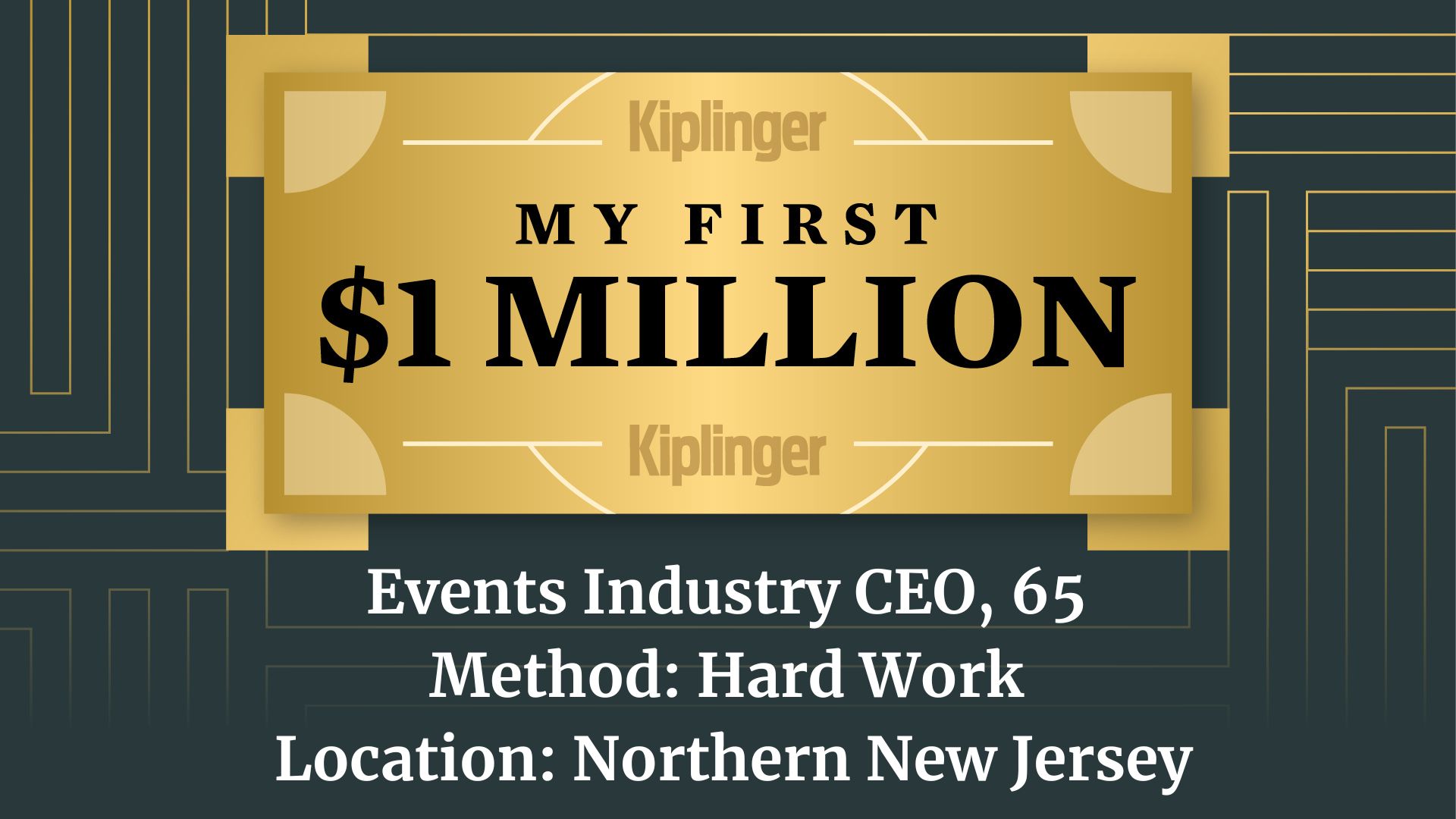My First $1 Million: Events Industry CEO, 65, Northern New Jersey
"Work hard and be totally honest. Own up to mistakes and protect your name and reputation above all other things."


Profit and prosper with the best of Kiplinger's advice on investing, taxes, retirement, personal finance and much more. Delivered daily. Enter your email in the box and click Sign Me Up.
You are now subscribed
Your newsletter sign-up was successful
Want to add more newsletters?
Welcome to the fourth installment of Kiplinger’s My First $1 Million, in which we hear from people who have made $1 million. They’re sharing how they did it and what they’re doing with it. This time, we hear from a 65-year-old events industry CEO in Northern New Jersey. See our earlier profiles, about a writer in New England, a literacy interventionist in Colorado and a semiretired entrepreneur in Nashville.
Each profile features one person or couple, who will always be completely anonymous to readers, answering questions to help our readers learn from their experience.
These features are intended to provide a window into how different people build their savings — they're not intended to provide financial advice.
From just $107.88 $24.99 for Kiplinger Personal Finance
Become a smarter, better informed investor. Subscribe from just $107.88 $24.99, plus get up to 4 Special Issues

Sign up for Kiplinger’s Free Newsletters
Profit and prosper with the best of expert advice on investing, taxes, retirement, personal finance and more - straight to your e-mail.
Profit and prosper with the best of expert advice - straight to your e-mail.
THE BASICS
How did you make your first $1 million?
The first million came through hard work in the trade show business. I traveled the world to different trade shows, finding good ones that did not have representation in the United States.
I convinced the owners of those shows that I could do a good job promoting their events in America and bringing U.S. firms to them accordingly.
Once I was contracted to do that, the even harder work began — educating and recruiting U.S. firms into overseas events.
What are you doing with the money?
Paid off the house. Then (invested in) stocks.
THE FUN STUFF

Did you do anything to celebrate?
I think my wife and I went out to dinner.
What is the best part of making $1 million?
Not having financial pressure. Being able to give back to family and charitable causes.
Did your life change?
No, other than take some pressure off. We knew we would be able to afford the house, college tuitions and “okay” cars.
Any plans to retire early?
No. I LOVE what I’m doing, and now I get a good deal of respect from industry (domestically and abroad), so I’m in no rush to retire.
LOOKING BACK
Anything you would do differently?
No.
Did you work with a financial adviser?
Yes, once. I trust myself more than them.
LOOKING AHEAD

Plans for your next $1 million?
Nothing much different. Stay focused.
Any advice for others trying to make their first $1 million?
Look for industry sectors with upside potential. Work hard and be TOTALLY honest.
Own up to mistakes with overgenerous compensation — i.e. protect your name/reputation above all other things.
What do you wish you'd known …
When you first started saving? Play the stock market. And DON’T worry when it goes down. It’s only paper money until you cash in. it WILL go up and down.
When you first started investing? That Apple and Amazon would go ballistic.
If you have made $1 million or more and would like to be anonymously featured in a future My First $1 Million profile, please fill out and submit this Google Form or send an email to MyFirstMillion@futurenet.com to receive the questions. We welcome all stories that add up to $1 million or more in your accounts, although we will use discretion in which stories we choose to publish, to ensure we share a diversity of experiences. We'll also want to verify that you really do have $1 million. Your answers may be edited for clarity.
Related Content
- You're 62 Years Old With $1 Million Saved: Can You Retire?
- Want to Earn $1 Million More Over Your Lifetime? Do This
- Do You Have at Least $1 Million in Tax-Deferred Investments?
- Are You Rich? U.S. Net Worth Percentiles Can Provide Answers
- Compare Your Net Worth by Age
Profit and prosper with the best of Kiplinger's advice on investing, taxes, retirement, personal finance and much more. Delivered daily. Enter your email in the box and click Sign Me Up.

As Contributed Content Editor for the Adviser Intel channel on Kiplinger.com, Joyce edits articles from hundreds of financial experts about retirement planning strategies, including estate planning, taxes, personal finance, investing, charitable giving and more. She has more than 30 years of editing experience in business and features news, including 15 years in the Money section at USA Today.
-
 4 High-End Experiences Worth the Splurge After 50
4 High-End Experiences Worth the Splurge After 50These curated date ideas provide the perfect backdrop for couples ready to enjoy the very best that the world has to offer.
-
 Health Care Stocks Have Sagged. Can You Bet on a Recovery?
Health Care Stocks Have Sagged. Can You Bet on a Recovery?The flagging health care sector has perked up a bit lately. Is it time to invest?
-
 Costco's Auto Program: Can Membership Pricing Really Save You Money on a Car?
Costco's Auto Program: Can Membership Pricing Really Save You Money on a Car?Costco's Auto Program can simplify the car-buying process with prearranged pricing and member perks. Here's what to know before you use it.
-
 Health Care Stocks Have Sagged. Can You Bet on a Recovery?
Health Care Stocks Have Sagged. Can You Bet on a Recovery?The flagging health care sector has perked up a bit lately. Is it time to invest?
-
 What Is an Assumable Mortgage and Could It Save You Thousands?
What Is an Assumable Mortgage and Could It Save You Thousands?With mortgage rates still elevated, taking over a seller’s existing home loan could lower monthly payments — if the numbers work.
-
 Your Retirement Age Is Just a Number: Today's Retirement Goal Is 'Work Optional'
Your Retirement Age Is Just a Number: Today's Retirement Goal Is 'Work Optional'Becoming "work optional" is about control — of your time, your choices and your future. This seven-step guide from a financial planner can help you get there.
-
 Have You Fallen Into the High-Earning Trap? This Is How to Escape
Have You Fallen Into the High-Earning Trap? This Is How to EscapeHigh income is a gift, but it can pull you into higher spending, undisciplined investing and overreliance on future earnings. These actionable steps will help you escape the trap.
-
 I'm a Financial Adviser: These 3 Questions Can Help You Navigate a Noisy Year With Financial Clarity
I'm a Financial Adviser: These 3 Questions Can Help You Navigate a Noisy Year With Financial ClarityThe key is to resist focusing only on the markets. Instead, when making financial decisions, think about your values and what matters the most to you.
-
 Dow Absorbs Disruptions, Adds 370 Points: Stock Market Today
Dow Absorbs Disruptions, Adds 370 Points: Stock Market TodayInvestors, traders and speculators will hear from President Donald Trump tonight, and then they'll listen to Nvidia CEO Jensen Huang tomorrow.
-
 Where Olympians Store Their Medals is a Great Lesson For Your Valuables and Cash
Where Olympians Store Their Medals is a Great Lesson For Your Valuables and CashWhat you can learn about protecting your cash and values from where Olympians store their medals.
-
 It's Time to Bust These 3 Long-Term Care Myths (and Face Some Uncomfortable Truths)
It's Time to Bust These 3 Long-Term Care Myths (and Face Some Uncomfortable Truths)None of us wants to think we'll need long-term care when we get older, but the odds are roughly even that we will. Which is all the more reason to understand the realities of LTC and how to pay for it.